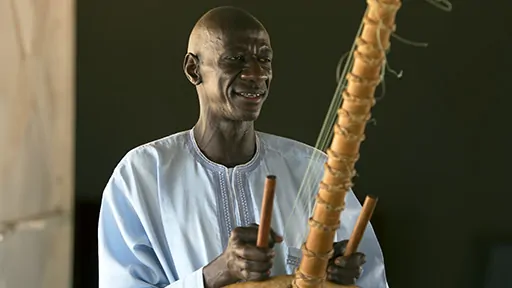Opinion Editorial Archive July, 2019: Music of a People

There's a simple reason why Queen's performance at Live Aid 34 years ago this month is still widely considered the greatest live music performance ever: They performed the music of a people. I was one of those who watched it live (on TV) and who witnessed something special: for twenty immortal minutes a third of the world's then-population were a single people. I doubt whether that will ever happen again.
Three months later, and also in London, we saw again how stirring the music of a people can be at the world premiere of Les Misérables. There's also a simple reason why that stage musical's song containing the lyric "It is the music of a people..." has become the world's de facto protest song: Its original title (translated from French) is "By the Will of the People."
The man in this month's photo is literally playing the music of a people. In his case it is the music of the Mandinka — an indigenous people of West Africa. He is a Griot and he is playing a Kora. Griots are musical storytellers and historians in his culture and it is only because of people like him that the oral history of the Mandinka has survived to the present day.
Four years after Live Aid, we watched as the only historically-factual part of the story of Les Misérables (the student rebellion in Paris) was eerily brought back to life in Tiananmen Square in Beijing, China. There, the music of a people was also sung in protest. Thirty years ago last month, the Chinese Communist Party brutally quashed that protest with ruthlessness and bloodshed. Today, in China, the event officially never happened. Nor will we hear "It is the music of a people..." being sung there: That song is banned lest it inspire another Tiananmen Square-style protest.
But the Chinese Communist Party did celebrate the anniversary last month. One part of its celebrations was to pressurize the Hong Kong government into passing legislation allowing extradition for criminal offenses. At great risk to themselves, hundreds of thousands took to the streets of Hong Kong in protest. They sang "It is the music of a people..." They view the legislation as interference and a violation of Hong Kong's judicial independence from China. As this goes to press, Hong Kong celebrates the twenty-second anniversary of that judicial independence. More protests have just begun there and the situation is far from resolved.
Hundreds of thousands is also the number that tells us why the new law is feared in Hong Kong. It is the estimated number of Uighurs — an indigenous people of Central Asia — who are incarcerated in China on suspicion of Orwellian "thought crime." A second part of the Chinese Communist Party's anniversary celebrations was to invite journalists into some of the "schools" (read, prisons) where the Uighur are being forced to sing not the music of their people but that of the Party. Incredulously, during John Sudworth's visit for the BBC last month, they made the claim that they can predict when a Uighur is about to commit a crime! Extraordinary scientific claims such as this, of course, require extraordinary evidence. But there is none. Perhaps the 2002 film, Minority Report was subtitled incorrectly in Mandarin. Someone should inform the Chinese Communist Party that the film is fiction.
The history of the Mandinka people is peppered with persecution. But at least they have been allowed to pass down that history through their Griots. As the G20 gathered for their Summit a few days ago, an opportunity was available to bring attention to the Uighur ethnocide. Some had recently encouraged that opportunity including Rebiya Kadeer, Dolkun Isa, Mike Pompeo, Michelle Bachelet, Sophie Richardson and Sarah Brooks. Instead, the focus was, predictably, on trade deals. Like the protests in Tiananmen Square thirty years ago, the Uighur people and their music may, thirty years from now, officially not exist in China.
Indigenous Dances of West Africa (short film on YouTube)
Learn more about the Mandinka people.
They Come For Us At Night: Inside China's Hidden War on Uighurs.
If you enjoyed reading this month's opinion editorial, please consider supporting independent, advertising-free journalism by buying us a coffee to help us cover the cost of hosting our web site. Please click on the link or scan the QR code. Thanks!

